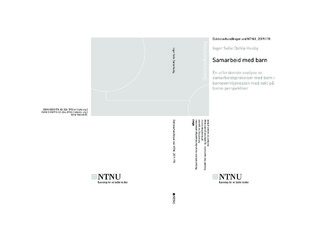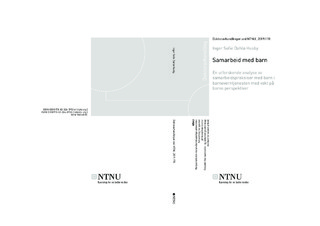| dc.contributor.advisor | Kiik, Riina | |
| dc.contributor.advisor | Juul, Randi | |
| dc.contributor.advisor | Slettebø, Tor | |
| dc.contributor.author | Husby, Inger Sofie Dahlø | |
| dc.date.accessioned | 2019-08-02T08:03:16Z | |
| dc.date.available | 2019-08-02T08:03:16Z | |
| dc.date.issued | 2019 | |
| dc.identifier.isbn | 978-82-326-3953-3 | |
| dc.identifier.issn | 1503-8181 | |
| dc.identifier.uri | http://hdl.handle.net/11250/2607017 | |
| dc.description.abstract | Sammendrag
Samarbeid med barn
En utforskende analyse av samarbeidspraksiser med barn i barneverntjenesten med vekt på barns perspektiver.
Samarbeid med barn er et viktig prinsipp i barnevernet. I den senere tid har samarbeid som arbeidsform fått mye oppmerksomhet. Barn med erfaring fra barnevernet, politikere og andre med ansvar for barnevernet har begynt å snakke om at hjelp til utsatte barn må skje i en samskapende prosess med barnet. Relasjonen mellom barnet og hjelper har stor betydning. Barnevernsarbeidere utfordres dermed på hvordan de kan etablere positive relasjoner til barn og gi barna en rolle som samarbeidspartnere.
Begrepet samarbeid med barn er derimot i liten grad gjort til gjenstand for teoretisering, og i barneverntjenesten er samarbeid som arbeidsform lite utviklet. Selv om det blir både teoretisert og forsket på barns medvirkning i barnevernet.
I min avhandling diskuterer jeg viktige bærebjelker i et samarbeidsforhold mellom barn og barnevernsarbeidere. Jeg har lagt til grunn at samarbeid handler om å finne nyskapende løsninger på oppgaver partene har felles. Dette er imidlertid utfordrende i barnevernet fordi barn opplever lite reell medvirkning.
Jeg har intervjuet barn og foreldre i barnevernet. Barna har fortalt om kontakten med barnevernarbeidere og andre involverte fagpersoner. Foreldrene har gitt et blikk inn i foreldreperspektivet på kontakten mellom barn og fagfolk. Egne erfaringer som barneforsker i studien er også benyttet som data.
Basert på teori om barns medvirkning, motstand og anerkjennelse i sosiale relasjoner og betydningen av lek og aktivitet innenfor sosialpedagogikken, har jeg utviklet ny kunnskap om hva som baner vei for samarbeid med barn i kontakt med barnevernet. Funnene viser at tillit til fagpersoner er avgjørende for om barnet er innstilt på samarbeid. Fagfolk som er i stand til å se når barn er i trøbbel og modige nok til å ta dette opp ved en passende anledning og i en passende dose, gis tillit. Mengden barnesamtaler, innholdet og formen er viktig. Barna er følsomme for krenkelser og de blir lei av fagpersoner som bare er opptatt av problemer. Dialogiske samtaleformer og en bevisst bruk av hjelpemidler og sosiale aktiviteter, gjør det mulig for barnet å opptre med verdighet, evner og ressurser. Det er også interessant at foreldrene etterspør flere samtaler med barna om vanskeligheter i hverdagen.
Funnene kan brukes til en kritisk gjennomgang av barnevernets praksiser. I tjenester som evner å endre praksis i tråd med funnene, er sjansen større for at barn opplever reell medvirkning og at innholdet i hjelpen blir et samarbeidsprosjekt. | nb_NO |
| dc.description.abstract | Summary
Collaboration with children
An exploratory analysis of collaborative practices with children in the child welfare system focusing on children's perspectives
Collaboration with children is an important principle in Child Welfare. Recently collaborative methods are strongly endorsed. Children with experience from the Child Welfare Service, politicians, and other child welfare professionals believe that help children at risk should take place as a co-creation process with the child as a partner. This means the relationship between the child and the helper is of great importance. Child welfare workers are thus challenged to build positive relationships with children and look at the child as a teammate.
However, the concept of collaboration with children has not been subject to theorization in the field of child welfare and as working practice, it is poorly developed. Even though research and theory on child participation are constantly carried out.
In my thesis, I discuss important pillars to make collaboration happen between children and child welfare workers. Finding innovative solutions to joint tasks is my basic view of collaboration. This is challenging in the Child Welfare Service because children experience little real participation.
I made interviews with children and parents in the Child Welfare Service. The children told about contact with child welfare workers and other involved professionals. The parent's narratives give a look into the father's and mother's experiences on the contact between children and professionals. In addition, I make use of my own experience as a child researcher in this study.
I have developed new knowledge about making collaboration happen among children and child welfare workers, based on theories of child participation, social resistance and recognition, and the importance of play and activity in social pedagogy. The findings show that trust in professionals is crucial for the child's motivation to be a teammate. Trust is given to professionals being able to see when children are in trouble and being brave enough to raise the question on a proper occasion and on a proper scale. The number of conversations, the content and the way of doing them is important to the child. The children are sensitive to a feeling of disrespect, and they get bored by professional focusing on problems only. Dialogue based conversations and conscious use of tools and social activities enable the child to appear with dignity, capability, and resources. Interestingly, the parents requested more conversations with the children about everyday life difficulties.
The findings can be used for a critical review of the Child Welfare Services. Services that manage to adjust their practices in line with the findings have a greater chance to make real participation happen, and thus the Child Welfare help to children at risk may become more like a collaborative project. | nb_NO |
| dc.language.iso | nob | nb_NO |
| dc.publisher | NTNU | nb_NO |
| dc.relation.ispartofseries | Doktoravhandlinger ved NTNU;2019:178 | |
| dc.relation.haspart | Artikkel 1: Husby, Inger Sofie Dahlø. The Children's Interview - From resistance to partnership. I: The Welfare Society - an Aim for Social Development. LIT Verlag 2016 ISBN 9783643907189. s. 183-201 | nb_NO |
| dc.relation.haspart | Artikkel 2: Husby, I. S. D., Slettebø, T., & Juul, R. (2018). Partnerships with children in child welfare: The importance of trust and pedagogical support. Child & Family Social Work, 23(3), 443– 450
https://doi.org/10.1111/cfs.12435| | nb_NO |
| dc.relation.haspart | Artikkel 3: Husby, I. S. D., Kiik, R., & Juul, R. (2018). Children’s encounters with professionals – recognition and respect during collaboration. European Journal of Social Work, 1–12.
- Is not included due to copyright available at
https://doi.org/10.1080/13691457.2018.1473841 | nb_NO |
| dc.relation.haspart | Artikkel 4: Juul, R., Husby, I.S.D. (2018): Collaboration and conversations between children in Child Welfare Services and welfare professionals – Parents’ perspectives. | nb_NO |
| dc.title | Samarbeid med barn. En utforskende analyse av samarbeidspraksiser med barn i barneverntjenesten med vekt på barns perspektiver | nb_NO |
| dc.type | Doctoral thesis | nb_NO |

